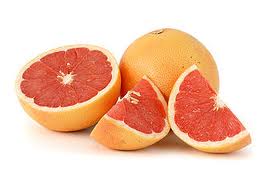 The grapefruit is a relatively new discovery, with only 300 years of cultivation and culinary use. In fact, grapefruit is thought to be derived from a horticultural accident in 18th century Jamaica. Thought to be a cross between the pummel and an orange, it is widely believed that the grapefruit came to life when Captain Shaddock brought pummel seeds from East Asia to the New World in the late 17th century.
The grapefruit is a relatively new discovery, with only 300 years of cultivation and culinary use. In fact, grapefruit is thought to be derived from a horticultural accident in 18th century Jamaica. Thought to be a cross between the pummel and an orange, it is widely believed that the grapefruit came to life when Captain Shaddock brought pummel seeds from East Asia to the New World in the late 17th century.
During the 18th century, the grapefruit was known as the “Forbidden Fruit” and was not widely consumed due to its rather bitter quality. During the late 19th century, the grapefruit finally gained popularity when John MacDonald established the first grapefruit nursery in southern Florida. From these early roots, the grapefruit, with its impressive ability to ship, was brought to the bustling cities of New York and Philadelphia. In these two cities, where sugar was plentiful, the popularity of this bitter fruit soared rather quickly. Today, grapefruit is a very popular fruit which can be found in any supermarket year round.
Key Nutrients
Grapefruit is a great source of flavonoids, potassium, folic acid and vitamin C. Grapefruit is also a great source of dietary fiber and is low in both saturated and unsaturated fat.
Health Benefits
Flavonoids – Flavonoids are a class of antioxidants which help to promote healthy cell growth and reduce inflammation. They are also a powerful class of molecules when it comes to reducing the risk of certain cancers.
Potassium – Potassium is an essential mineral which aids in fluid regulation, protein synthesis and cardiovascular health. High levels of potassium are associated with reduced risk for stroke, improved blood pressure control as well as bone health.
Vitamin B12 – Vitamin B12, or folic acid, helps to preserve neurological function and DNA synthesis. It also plays a key role in the health of red blood cells. The nervous system relies on vitamin B12 for proper function as well.
Dietary Fiber – Dietary Fiber stimulates digestion and peristalsis, helping to relieve indigestion and constipation problems.
Vitamin C – Regular consumption of foods rich in vitamin C helps the body develop resistance against infections and scavenges harmful, pro-inflammatory free radicals. Vitamin C also helps to prevent respiratory problems such as asthma and lung cancer. Vitamin C has been shown to lower blood pressure, and therefore lessen the probability of hypertension.
Season
The grapefruit season varies from region to region. In the United States, the season lasts from January to June, while the Southern hemisphere season lasts from June to January. For this reason, you can find grapefruit in your supermarket year round.
Nutrition Information
Per 1 Fruit (123 grams):
Calories (cKal): 52
Protein (grams): .95
Total Fat (grams): .17
Carbohydrates (grams): 13.11
Fiber (grams): 2
Buying and Storing
When buying grapefruit, make sure the fruit is soft to the touch and free of blemishes. When storing at home, grapefruit can last on your countertop for up to ten days, on in your refrigerator for up to two weeks.
Best Way to Add to Diet
Grapefruit makes a great breakfast by itself, served with a bit of honey or agave to reduce the bitterness. Grapefruit also makes a great cooking liquid for any fish ceviche.
Grapefruit Recipe

 Not Sure What Healthy Foods To Eat?
Not Sure What Healthy Foods To Eat? This week we take a look at one of my favorite healthy foods...the mighty Avocado.
This week we take a look at one of my favorite healthy foods...the mighty Avocado.
No comments yet.